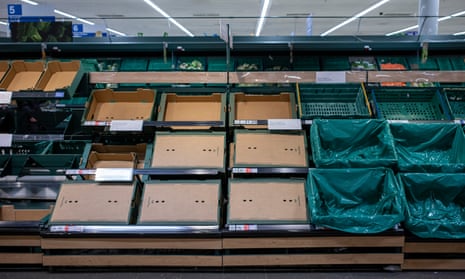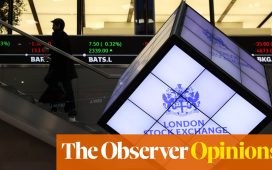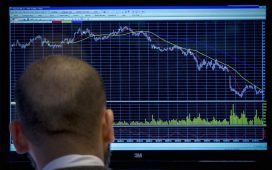BOE governor signals rates may have peaked
The Bank of England governor, Andrew Bailey, has signalled interest rates may have peaked after 10 successive increases in the official cost of borrowing since December 2021.
Speaking in London, Bailey said Threadneedle Street would assess the impact of tighter policy on the economy before sanctioning any fresh moves.
However, the governor also warned that the Bank was alert to the risk of repeating the mistakes of the 1970s and would not hesitate to raise rates further from their current 4% should inflationary pressures become embedded.
Bailey voted for a quarter-point increase in interest rates at the last meeting of the Bank’s nine-strong monetary policy committee in February but made clear on Wednesday that he was now adopting a wait-and-see approach.
“At this stage, I would caution against suggesting either that we are done with increasing Bank rate, or that we will inevitably need to do more,” he said. “Some further increase in Bank rate may turn out to be appropriate but nothing is decided. The incoming data will add to the overall picture of the economy and the outlook for inflation, and that will inform our policy decisions.”
Key events
Just Eat Takeaway, Europe’s biggest food delivery company, has reported a €5.7bn loss for 2022, up from €1bn in 2021, caused by a large impairment charge of £4.6bn incurred on acquisitions.
This includes writedowns for the $7.3bn purchase of US firm Grubhub in 2020 and Just Eat’s £6.2bn merger with the Dutch firm Takeaway.com, also in 2020.
The shares fell as much as 10% before recovering to trade up 1.7%. The Amsterdam-based company is under pressure from investors to sell Grubhub but is struggling to find a buyer.
Wall Street has opened slightly lower: the Dow Jones is down 54 points, or 0.2%, at 32,602 while the Nasdaq is little changed at 11,451 and the S&P 00 has slipped 0.2% to 3,961.
Market summary: stocks, metals up on strong China expansion
On the markets, European stocks are pushing cautiously higher. The FTSE 100 index in London is up 54 points, or 0.7%, at 7,930. Germany’s Dax, France’s CAC and Italy’s FTSE MiB are all up nearly 0.2%.
The pound is a tad higher against the dollar at $1.2022, and down 0.9% against the euro at €1.1263.
Crude oil prices have retreated, with Brent crude, the global benchmark, down 0.4% at $83.08 a barrel while US light crude is 0.7% lower at $76.52 a barrel.
Prices for industrial metals have risen after surveys showing a strong expansion in China’s manufacturing sector, following the lifting of Covid restrictions. China is the biggest metals consumer in the world. Benchmark copper gained 1.3% to at $9,080 a tonne while aluminium, zinc, nickel, lead and tin also all rose on the London Metal Exchange.
German inflation unexpectedly picks up
In Germany, inflation unexpectedly picked up last month driven by higher food prices.
The harmonised index of consumer prices (which is comparable to other European countries) rose to 9.3% from 9.2% in January, according to official figures from Destatis. Analysts had expected it to ease to 9%.
This comes a day after Spain and France also posted unexpected rises, to 6.1% and 7.2% respectively.
Germany’s national inflation rate was 8.7%, the same as in January. Food prices rose 21.8% year-on-year, up from 20.2% in January, while energy prices were 19.1% higher versus 23.1% in January.
Unemployment in Germany, Europe’s biggest economy, fell by 9,900 from the month before to 1.32 million people in January, with the jobless rate at 3% (in seasonally adjusted terms).
Wages rose 3.5% last year while consumer prices climbed 6.9% over the year. This means that real wages, adjusted for inflation, were 3.1% lower than in 2021, marking the third year of declines (including two years of Covid pandemic).
BOE governor signals rates may have peaked
The Bank of England governor, Andrew Bailey, has signalled interest rates may have peaked after 10 successive increases in the official cost of borrowing since December 2021.
Speaking in London, Bailey said Threadneedle Street would assess the impact of tighter policy on the economy before sanctioning any fresh moves.
However, the governor also warned that the Bank was alert to the risk of repeating the mistakes of the 1970s and would not hesitate to raise rates further from their current 4% should inflationary pressures become embedded.
Bailey voted for a quarter-point increase in interest rates at the last meeting of the Bank’s nine-strong monetary policy committee in February but made clear on Wednesday that he was now adopting a wait-and-see approach.
“At this stage, I would caution against suggesting either that we are done with increasing Bank rate, or that we will inevitably need to do more,” he said. “Some further increase in Bank rate may turn out to be appropriate but nothing is decided. The incoming data will add to the overall picture of the economy and the outlook for inflation, and that will inform our policy decisions.”
Here is some analysis: How rising interest rates have sent the UK housing market into reverse, from our economics editor Larry Elliott.
Since the turn of the year the news on the economy has been less bad than expected. Growth has been a bit stronger, spending in the shops a touch higher, business and consumer confidence have both picked up.
There has, however, big one big exception to this trend – the state of the housing market. The Nationwide building society reported on Wednesday that prices were down for a sixth month in a row in February, leading to a 1.1% annual drop in property values.
And here’s our full story on the declines in mortgage approvals and lending, and the hefty rise in consumer borrowing such as credit cards.
Britain’s mortgage market has contracted for a fifth month in a row, official figures show, as the jump in interest rates that followed Liz Truss’s September 2022 mini-budget continued to trigger a collapse in demand for new home loans.
The Bank of England said the drop in January took the number of mortgage approvals to the lowest level since 2009, which followed the 2008 financial crash, excluding the dramatic drop after the first Covid-19 lockdown in 2020.
E.ON’s UK boss jumps ship to join Germany’s Uniper

Alex Lawson
The UK boss of energy supplier E.ON is jumping ship to join bailed-out German power group Uniper.
Michael Lewis has led German-owned E.on’s UK business, the second largest gas and electricity supplier in the country, since 2017. He has spent three decades in the industry, first with Powergen, which was then taken over by E.on in 2002. He ran E.on’s renewables business and, as UK chief, bought npower to bring E.on’s UK customer base over five million.
Uniper, which owns the Ratcliffe-on-Soar coal power plant in Nottinghamshire, was plunged into crisis last year by the reduction in Russian gas linked to the war in Ukraine and the company was bailed out by the German government.
Lewis has been a powerful voice during the energy crisis which has seen 29 UK suppliers fail, costing billpayers billions of pounds. Last year he told The Observer that the collapsed firms had left a “trail of destruction”.
Lewis said:
After almost 30 years at Powergen and E.on it will be a huge wrench to step away from this company but I am incredibly proud of all we have achieved in those years.
Lewis does not have a start date but E.On has begun the process of finding a successor. At Uniper, he replaces Klaus-Dieter Maubach whose last day in the role was yesterday.

UK farmers call for urgent action to tackle empty shelves

Joanna Partridge
Britain’s farmers have launched a strategy to boost domestic horticulture, just as many supermarket shelves for fresh produce are empty, and as shoppers face limits at major grocers on purchases of tomatoes, cucumbers and peppers.
The National Farmers’ Union (NFU) is calling on government to support its call for better access to workers to pick crops, more access to affordable and sustainable energy, and also fairness in food supply chains. UK growers have been warning for some time – well before the recent shortages in fresh produce became visible in the shops – that they were facing a string of challenges, some of which have been intensified by the pandemic and Brexit.
The NFU estimated that £60m worth of fresh produce was left to rot in fields last year, as growers could not get enough workers to pick their fruit and vegetables at the right time. NFU president Minette Batters said:
The consequences of undervaluing growers can be seen on supermarket shelves right now. Shelves are empty. This is a reality we’ve been warning government about for many months. Without urgent action there are real risks that empty shelves may become more commonplace as British horticulture businesses struggle with unprecedented inflationary pressures, most notably on energy and labour costs.
In recent weeks, growers with glasshouses – needed for growing tomatoes, cucumbers and other crops in northern Europe at this time of year – have complained that they are not receiving government support to heat and light their buildings, at a time of soaring energy bills, while botanical gardens have been eligible for government support.
Since Brexit, there have been government limits on how many overseas workers can come to Britain to work on farms. Ministers have granted 45,000 seasonal worker visas from 1 April, but this is 15,000 more than last year. The farming minister has said there is the possibility of adding a further 10,000 if required.
The NFU is also calling for fairness in the supply chain – particularly at a time when retailers are trying to keep their own costs low so they do not need to pass price increases on to their customers – as well money to invest in productivity and more access to environmental funding schemes.
Martin Emmett, chair of the NFU’s horticulture and potatoes board, said:
For too long, we’ve only had warm words from government about how important the horticulture sector is but no detail on how it wants to achieve growth. … The time to act is now.

Bank of England’s Bailey: ‘Have to monitor carefully how tightening works its way through’
Bank of England governor Andrew Bailey is speaking about the cost of living squeeze and the future path of interest rates at a conference in London.
The central bank has raised rates to 4% at its February meeting in an attempt to bring inflation down towards its 2% target, and further rate hikes are expected. Bailey said this will depend on the economic data:
If we do too little with interest rates now, we will only have to do more later on. The experience of the 1970s taught us that important lesson.
But equally – second – we have to monitor carefully how the tightening we have already done is working its way through the economy to the prices faced by consumers. Our outreach events make clear that we need to calibrate monetary policy with great care to return inflation to target sustainably.
That is the best contribution monetary policy can make to a fair society.
He went on to say:
At this stage, I would caution against suggesting either that we are done with increasing Bank Rate, or that we will inevitably need to do more. Some further increase in Bank Rate may turn out to be appropriate, but nothing is decided. The incoming data will add to the overall picture of the economy and the outlook for inflation, and that will inform our policy decisions.
Viasat takeover of Inmarsat is cleared

Mark Sweney
The $7.3bn (£5.4bn) takeover of the British satellite company Inmarsat by its US rival Viasat has been cleared, after the UK regulator decided that rivals such as Elon Musk’s Starlink are providing increasing competition.
The Competition and Markets Authority (CMA) had raised significant competition concerns about the deal, saying in October that the merger could result in higher-priced and lower-quality wifi for UK aeroplane passengers. At the time the CMA, which subsequently launched an in-depth investigation into the deal, said that new players in the satellite communications market seeking to target the aviation sector such as Starlink, OneWeb and Telesat may not be able to effectively compete against a combined Inmarsat and Viasat.
“While Viasat and Inmarsat compete closely, the evidence suggests that the merged company will face significant competition in the coming years – from both emerging players like Starlink and from established firms like Intelsat and Panasonic,” said Richard Feasey, chair of the independent inquiry group carrying out the in-depth CMA investigation. “This competition has led us to provisionally conclude that airlines and their UK customers will not be adversely affected by the deal.”
The UK government has already cleared the deal, saying the takeover of Inmarsat did not pose a threat to national security. Inmarsat provides mobile satellite services that underpin email, internet and video conferencing, as well as in-flight wifi and communications services for ships. Its takeover is the California-based Viasat’s largest-ever acquisition.
UK mortgage approvals lowest since 2009 excluding Covid period; consumer credit doubles
The latest Bank of England figures show sharp declines in mortgage approvals and lending in January, as the housing market continues to slow.
There was also a hefty rise in consumer credit, as people borrowed more on credit cards, loans etc as they struggled with soaring food and energy bills.
-
Net mortgage lending to individuals decreased from £3.1bn to £2.5bn in January.
-
Net mortgage approvals for house purchases decreased to 39,600 in January from 40,500 in December, marked the fifth consecutive monthly decrease in mortgage approvals. If the onset of the Covid-19 pandemic and period immediately thereafter is excluded (when the housing market ground to a halt), this was the lowest approvals since January 2009 (32,400).
-
The ‘effective’ interest rate – the actual interest rate paid – on newly drawn mortgages increased by 21 basis points, to 3.88% in January.
-
Consumers borrowed an additional £1.6bn in consumer credit, compared with £800m borrowed in December. This was split between £1.1bn of borrowing on credit cards and £500m of borrowing through other forms of consumer credit.
UK manufacturing production rises for first time in eight months
Over here, the UK manufacturing sector showed a resilient performance in February.
Stabilising client demand and improved supply chains boosted production, while inflationary pressures also eased further, with costs rising at the slowest rate since July 2020.
The final reading for the S&P Global / CIPS UK manufacturing purchasing managers’ index (PMI) rose to 49.3 in February, up from 47.0 in January and the earlier flash estimate (49.2). Although the PMI remained below the neutral mark of 50.0 for the seventh successive month, this was the best reading during that period.
Manufacturing production rose for the first time in eight months, albeit only slightly. The increase was underpinned by signs of firming client demand, with consumer and investment goods the only industries to see new orders increase.
Strong China PMIs point to high GDP growth target
In China, the manufacturing sector expanded at its fastest pace in more than a decade in February, as demand recovered after Beijing eased its strict zero Covid policy. The solid PMI readings suggest that the government will set a high GDP growth target, analysts said.
The official manufacturing and non-manufacturing PMI indices for February came in at 52.6 and 56.3, respectively. This compares with readings of 50.1 and 54.4 respectively in January. The CAIXIN manufacturing PMI rose to 51.6, from 49.2 in January. The numbers beat market expectations.
Iris Pang, chief economist for Greater China at ING, said:
Both manufacturing and non-manufacturing PMIs for February were very strong. Some sub-indices are the highest in several years. This supports our view that the Two Sessions government meeting will set a high GDP growth target.
We believe that the government will set a GDP growth target of 5.5% to 6% at the Two Sessions on 5 March. This set of PMI data gives the government a very good reason to set a high growth target. Even though the recovery is on track, this year will not be easy with the central government requiring local governments to grow their economies with high-quality growth prospects in mind.
Aston Martin losses double in 2022

Jasper Jolly
Aston Martin has revealed that its losses more than doubled during 2022 as the sportscar maker spent heavily on new models and struggled through supply chain problems hitting the global car industry.
The UK-listed carmaker reported a loss before tax of £495m in 2022, up from £214m the year before, even as sales rose 26% to £1.4bn. It made an operating loss of £118m after adjusting for some one-off costs, less than the £135m expected by analysts.
The company has struggled for years to turn itself around after an overambitious listing on the London Stock Exchange in late 2018. It was taken over in early 2020 by the fashion billionaire Lawrence Stroll, just as the coronavirus pandemic hit.
Since then, Stroll has as the executive chair sought to move Aston Martin’s brand upmarket – with higher prices – and cut its crippling debt pile, including a £650m fundraising in July that took money from Saudi Arabia’s public investment fund.
Aston Martin sold 6,400 cars during 2022 but it was hit by higher spending including reinvestments including marketing and expensive new product launches, as well as the impact of high inflation across its operations. At the same time it spent £287m mainly on developing new models.

Eurozone manufacturing output at nine-month high
Manufacturing production across the eurozone stabilised in February, ending an eight-month run of contracting output. Manufacturers in Italy, Greece and Spain lent the greatest support to factory output in February, while Germany and France trailed behind.
The final reading for the manufacturing PMI from S&P Global came in at 48.5, below the 50 mark that divides contraction from growth. However, the output sub-index improved and rose about that mark to a nine-month high, indicating expansion.
The survey said:
According to survey respondents, easing supplier bottlenecks and improved raw material availability reduced the strain on production schedules. Indeed, supplier delivery times shortened to the greatest extent since May 2009. Consequently, cost pressures faced by goods producers eased considerably once again, with the overall rate of input price inflation slowing to a marginal pace that was the weakest in almost two-and-a-half years.
Key findings:
Eurozone Final February Manufacturing PMI confirmed at 48.5
Periphery led the index while Germany and France lagged.Activity seems recovering after bad Q4 but still not in expansionary territory for the whole Union.
Let see if Chinese reopening now fully on track will help. pic.twitter.com/6TIETa0sJz— Mario Cavaggioni (@CavaggioniMario) March 1, 2023











